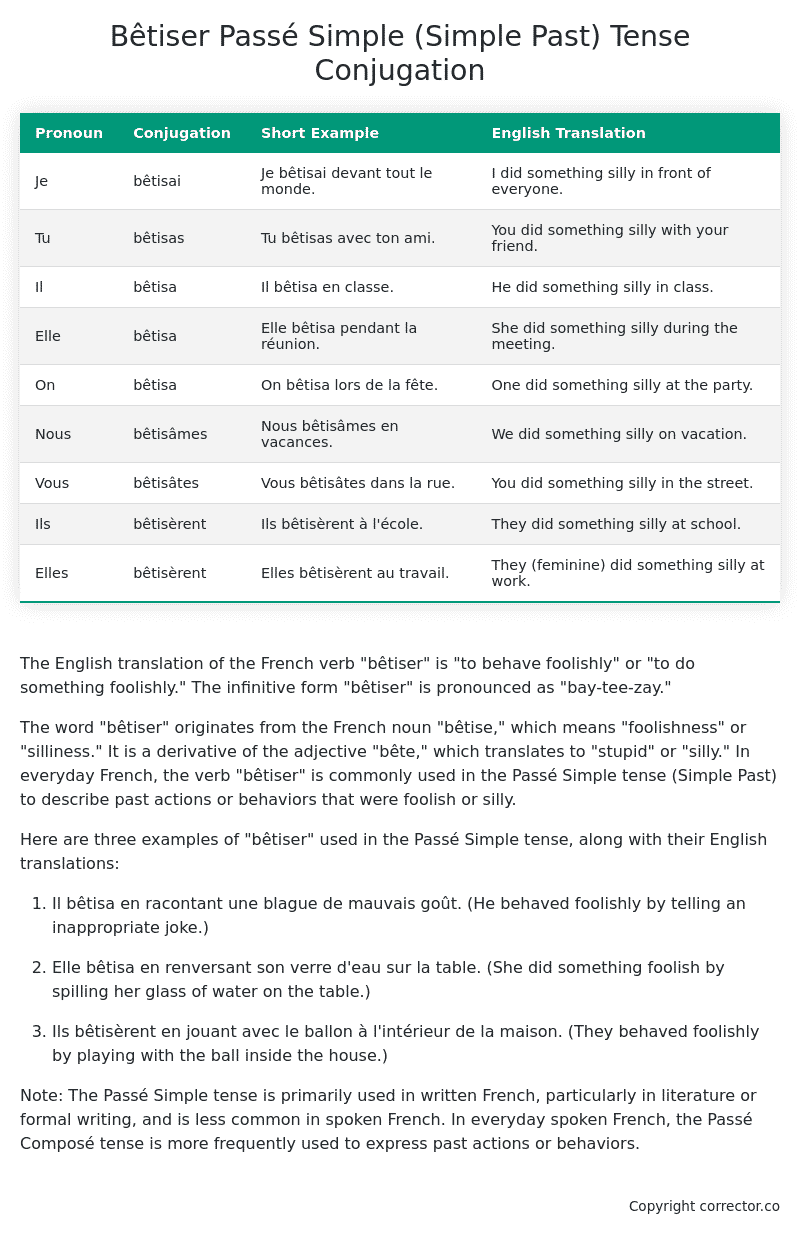Passé Simple (Simple Past) Tense Conjugation of the French Verb bêtiser
Introduction to the verb bêtiser
The English translation of the French verb “bêtiser” is “to behave foolishly” or “to do something foolishly.” The infinitive form “bêtiser” is pronounced as “bay-tee-zay.”
The word “bêtiser” originates from the French noun “bêtise,” which means “foolishness” or “silliness.” It is a derivative of the adjective “bête,” which translates to “stupid” or “silly.” In everyday French, the verb “bêtiser” is commonly used in the Passé Simple tense (Simple Past) to describe past actions or behaviors that were foolish or silly.
Here are three examples of “bêtiser” used in the Passé Simple tense, along with their English translations:
-
Il bêtisa en racontant une blague de mauvais goût.
(He behaved foolishly by telling an inappropriate joke.) -
Elle bêtisa en renversant son verre d’eau sur la table.
(She did something foolish by spilling her glass of water on the table.) -
Ils bêtisèrent en jouant avec le ballon à l’intérieur de la maison.
(They behaved foolishly by playing with the ball inside the house.)
Note: The Passé Simple tense is primarily used in written French, particularly in literature or formal writing, and is less common in spoken French. In everyday spoken French, the Passé Composé tense is more frequently used to express past actions or behaviors.
Table of the Passé Simple (Simple Past) Tense Conjugation of bêtiser
| Pronoun | Conjugation | Short Example | English Translation |
|---|---|---|---|
| Je | bêtisai | Je bêtisai devant tout le monde. | I did something silly in front of everyone. |
| Tu | bêtisas | Tu bêtisas avec ton ami. | You did something silly with your friend. |
| Il | bêtisa | Il bêtisa en classe. | He did something silly in class. |
| Elle | bêtisa | Elle bêtisa pendant la réunion. | She did something silly during the meeting. |
| On | bêtisa | On bêtisa lors de la fête. | One did something silly at the party. |
| Nous | bêtisâmes | Nous bêtisâmes en vacances. | We did something silly on vacation. |
| Vous | bêtisâtes | Vous bêtisâtes dans la rue. | You did something silly in the street. |
| Ils | bêtisèrent | Ils bêtisèrent à l’école. | They did something silly at school. |
| Elles | bêtisèrent | Elles bêtisèrent au travail. | They (feminine) did something silly at work. |
Other Conjugations for Bêtiser.
Le Present (Present Tense) Conjugation of the French Verb bêtiser
Imparfait (Imperfect) Tense Conjugation of the French Verb bêtiser
Passé Simple (Simple Past) Tense Conjugation of the French Verb bêtiser (You’re reading it right now!)
Passé Composé (Present Perfect) Tense Conjugation of the French Verb bêtiser
Futur Simple (Simple Future) Tense Conjugation of the French Verb bêtiser
Futur Proche (Near Future) Tense Conjugation of the French Verb bêtiser
Plus-que-parfait (Pluperfect) Tense Conjugation of the French Verb bêtiser
Passé Antérieur (Past Anterior) Tense Conjugation of the French Verb bêtiser
Futur Antérieur (Future Anterior) Tense Conjugation of the French Verb bêtiser
Subjonctif Présent (Subjunctive Present) Tense Conjugation of the French Verb bêtiser
Subjonctif Passé (Subjunctive Past) Tense Conjugation of the French Verb bêtiser
Subjonctif Imparfait (Subjunctive Imperfect) Tense Conjugation of the French Verb bêtiser
Subjonctif Plus-que-parfait (Subjunctive Pluperfect) Tense Conjugation of the French Verb bêtiser
Conditionnel Présent (Conditional Present) Tense Conjugation of the French Verb bêtiser
Conditionnel Passé (Conditional Past) Tense Conjugation of the French Verb bêtiser
Conditionnel Passé II (Conditional Past II) Tense Conjugation of the French Verb bêtiser
L’impératif Présent (Imperative Present) Tense Conjugation of the French Verb bêtiser
L’impératif Passé (Imperative Past) Tense Conjugation of the French Verb bêtiser
L’infinitif Présent (Infinitive Present) Tense Conjugation of the French Verb bêtiser
L’infinitif Passé (Infinitive Past) Tense Conjugation of the French Verb bêtiser
Le Participe Présent (Present Participle) Tense Conjugation of the French Verb bêtiser
Le Participe Passé (Past Participle) Tense Conjugation of the French Verb bêtiser
Struggling with French verbs or the language in general? Why not use our free French Grammar Checker – no registration required!
Get a FREE Download Study Sheet of this Conjugation 🔥
Simply right click the image below, click “save image” and get your free reference for the bêtiser Passé Simple tense conjugation!

Bêtiser – About the French Passé Simple (Simple Past) Tense
Formation
Usage
Narration
Historical Context
Interactions with other tenses
Passé Composé
Imparfait
Conditional and Subjunctive
Summary
I hope you enjoyed this article on the verb bêtiser. Still in a learning mood? Check out another TOTALLY random French verb conjugation!


